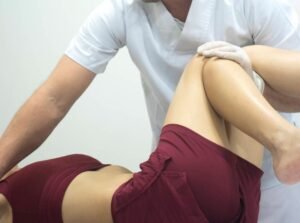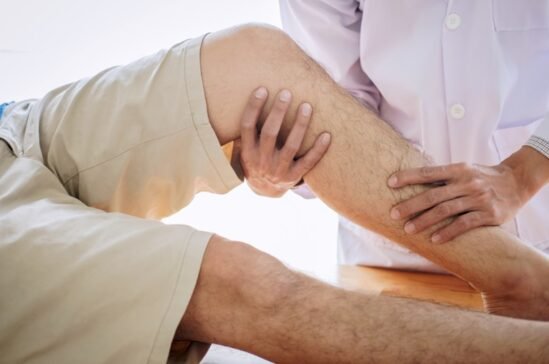Knee pain is a common issue affecting people of all ages, often resulting from injury or arthritis. It may be localized or widespread, varying in intensity. Symptoms include swelling, stiffness, redness, weakness, and an inability to straighten the knee.
Physiotherapy plays a vital role in treating knee pain. It strengthens muscles around the knee, enhances joint flexibility, and reduces pain and inflammation. Regular physiotherapy helps in faster recovery and prevents future knee injuries.
Effective Physiotherapy Treatments for Knee Pain
[1] Physical Exercises
Physical exercises are essential for maintaining overall health. This physiotherapy treatment for knee pain supports cardiovascular fitness, builds strength, improves mood, boosts energy levels, promotes better sleep and helps manage weight. Regular activity can also reduce the risk of chronic diseases.
[2] Stretching
Stretching is a fundamental part of physical activities, promoting flexibility, blood flow, and muscle health. It enhances athletic performance and lowers injury risk. Experts advocate proper stretching techniques as vital for a healthy workout regimen.
[3] Strengthening Exercises
Strengthening exercises are vital for overall health. They enhance muscle tone, improve bone density, and boost cardiovascular health. These exercises include weight lifting, resistance training, and bodyweight workouts, promoting endurance and physical resilience.
[3] Manual Therapy
Manual therapy is a specialized form of physical therapy, delivered with hands instead of a device or machine. It involves kneading and manipulation of muscles, joint mobilization, and joint manipulation to relieve pain and enhance healing.
[4] Hydrotherapy
Hydrotherapy is a therapeutic technique that uses water to relieve discomfort and promote physical well-being. This practice can come in several forms, including hot tubs, cold water treatments, and mineral baths, all aiming to stimulate blood circulation and treat the symptoms of certain diseases.
[5] Pain-relief Treatments
Pain-relief treatments involve interventions to alleviate discomfort caused by various conditions. They can be non-medical, such as physiotherapy and mindfulness, or involve medications and surgical procedures. Effectiveness varies, depending on the individual’s unique pain and health status.
[6] Heat and Cold Therapy
Heat and cold therapy are therapeutic approaches often used in physiotherapy to treat injuries. Heat therapy expands blood vessels, promoting blood flow and healing, while cold therapy restricts blood vessels, reducing inflammation and pain.
[7] TENS Therapy
Transcutaneous Electrical Nerve Stimulation (TENS) therapy is a method of pain relief involving the use of a low-voltage electrical current. It’s typically used to treat chronic or acute pain by stimulating nerves to reduce pain signals to the brain.
[8] Ultrasound Therapy
Ultrasound therapy is a popular method of treatment for musculoskeletal issues like pain and muscle tightness. It uses sound waves to deliver heat into the affected tissues, promoting healing and reducing inflammation.
Effective Physiotherapy Treatments for Alleviating Knee Pain
Tips for Optimizing Results from Physiotherapy
[1] Consistency with Exercises
Consistency with exercises is fundamental for achieving fitness goals. It ensures regular physical activity, which promotes cardiovascular health, muscle growth, and weight management. Consistency also builds exercise habits, making workouts an innate part of your routine.

[2] Proper Diet and Nutrition
Proper diet and nutrition are essential in maintaining health, enhancing immune function and preventing chronic diseases. It involves a balanced intake of proteins, carbohydrates, vitamins, minerals, and healthy fats followed by regular hydration.
[3] Regular Follow-up with the Physiotherapist
Regular follow-up with the physiotherapist is essential for effective treatment. It allows for progress tracking, and adjustment of exercises, and optimizes healing. Consistent communication ensures optimal recovery and mitigates any potential setbacks.
Conclusions
Physiotherapy for knee pain offers increased mobility, pain relief, and enhanced muscle strength. It reduces dependency on painkillers, improves balance, aids in weight management, and promotes overall well-being without surgical interventions. Consistency and adherence to professional advice are crucial towards accomplishing goals. The former cultivates discipline and facilitates progress while the latter harnesses expert knowledge for informed decisions. Taken together, they form a foundation for success.
Read More: Affordable Excellence: Discovering the Affordable Cost of Knee Surgery in India



